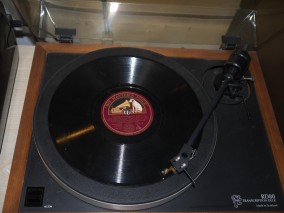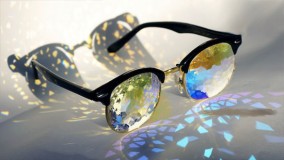
In Letters to a Young Poet, Rainer Maria Rilke called childhood as “that precious, kingly possession, that treasure house of memories.” The God of Knickknacks draws on my childhood.
My childhood gave me the gift of being able to write poetry, but not because I came from a family who read poems. My parents never looked at books and barely glanced at The Daily News or The Forward before my mother spread the pages over the freshly washed kitchen floor. But when I, their third daughter, was born, I was given what every writer needs to create: solitude, lots of it. I was free to leap and twirl, curls bouncing, from Simple Simon to Mistress Mary and Little Miss Muffet on the linoleum floor of my bedroom that was printed with nursery rhymes. I could recite each one as I landed on it, thanks to my 78-rpm vinyls that I played on my record player. Before I was two, I could place the arm on the spinning record as deftly as a brain surgeon using a scalpel. My mother, who would have loved being on stage, instead of in her kitchen, played music all day on the radio. “Oh, I’ve got a lovely bunch of coconuts,” I’d sing along:
“There they are a-standing in a row. Big ones, small ones, some as big as your head. Give ‘em a twist, a flick of the wrist, that’s what the showman said.”
The lyrics tasted better than Mars Bars or Snickers. The rhythms synched with my heartbeat like jump rope ditties.
But, the world of the child is fragile. Children depend on adults to steer their ships that are, upon reflection, as sinkable as leaky canoes. So, I’m drawn to the light and dark of life, the underbelly of danger, the question from the Unetanah Tokef prayer that is chanted on the high holiday of Rosh Hashanah, but lurks in my head throughout the year: “Who shall live and who shall die?” Joy stems from this ritual inquiry.
Nevertheless, I had my parents as buoys. My sassy mother made me laugh with her natural talent for metaphor. She nicknamed the clerk, in the hardware store, who had neglected and overcrowded teeth, “Eighty Green Teeth.” She dubbed little Opal Pickens, who was forever pulling at his penis, “O-pee Picker.” My Russian father could make memorable images too, especially about weather. A humid day was a “schvitz bad,” and during a storm he once said: “The wind moans like an old man in pain.”
My parents never thought of taking me to the library and I never thought of asking them. I didn’t even know where it was. But, when I was five, a neighbor who was moving away because the neighborhood had gone ‘downhill,’ gave us her grown son’s red-bound set of Childcraft Encyclopedia. After opening Volume One and recognizing in it the illustrated nursery rhymes that were my linoleum floor – with my index finger marking each word – I recited the nursery rhymes each day until I was hoarse. That was how I learned to read.
There’s always talk of ‘the mind’s eye,’ but sometimes I feel that my eyes are my mind. I take in what I see like a photograph. I jot the scene on the back of a shopping list or a napkin. If I keep at it, I can shape the poem: what it’s really about and why my eyes chose it in the first place. That’s how I approached writing Brooklyn Bridge Park.
No matter how much I study poetry now – the rhetoric of John Ashbery, the imagism of William Carlos Williams, or Whitman’s long, lyric lines – I know that my real impulse toward poetry comes from the open-eyed, open-eared, and untutored time when poetry just was a rhyme on my bedroom floor.
Rochelle Jewel Shapiro’s novel, Miriam the Medium (Simon & Schuster) was nominated for the Harold U. Ribelow Award. Kaylee’s Ghost was finalist in the Indie 2013 Awards. Shapiro’s essays have appeared in NYT (Lives), Newsweek, and more. Her poems have appeared in Iowa Review, Moment, Atlanta Review. She’s a phone psychic who teaches writing at UCLA Extension. Learn more about her by visiting this website: http://rochellejewelshapiro.com.



 Like many writers, I often find myself wanting to tell stories of usual encounters or new perspectives. While much of my fiction is the product of my imagination, my flash fiction story, Macroscopic Sacred Puzzles, is largely autobiographical. During the first weeks of my husband’s graduate school career, he was prescribed his first pair of glasses. It was an intensely unique experience for the both of us as he adjusted to his “perfect” vision.
Like many writers, I often find myself wanting to tell stories of usual encounters or new perspectives. While much of my fiction is the product of my imagination, my flash fiction story, Macroscopic Sacred Puzzles, is largely autobiographical. During the first weeks of my husband’s graduate school career, he was prescribed his first pair of glasses. It was an intensely unique experience for the both of us as he adjusted to his “perfect” vision.
